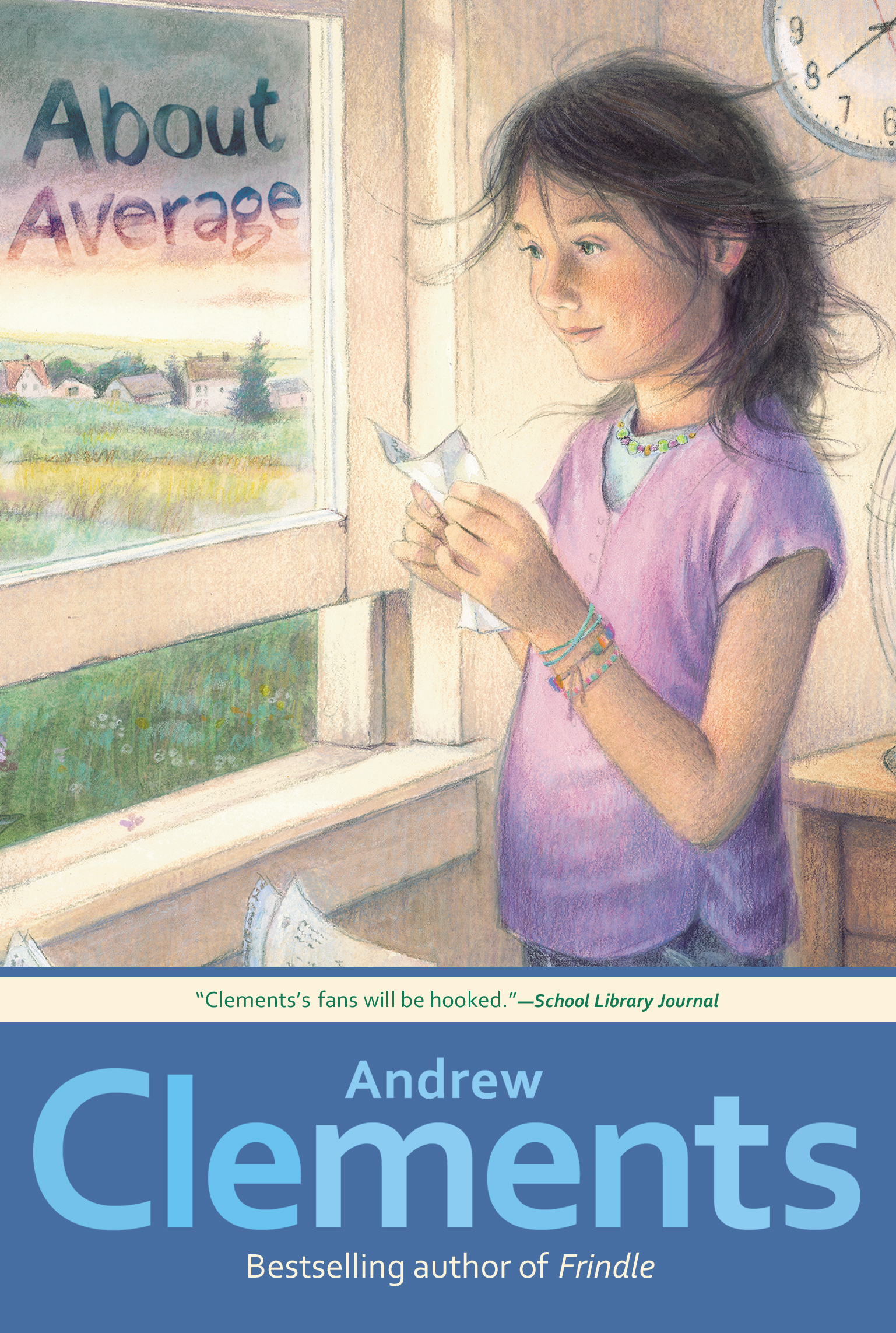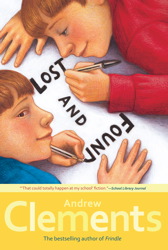Plus, receive recommendations and exclusive offers on all of your favorite books and authors from Simon & Schuster.
Table of Contents
About The Book
Jordan Johnston is average. Not short, not tall. Not plump, not slim. Not gifted, not flunking out. Even her shoe size is average. She’s ordinary for her school, for her town, for even the whole wide world, it seems.
Then Marlea Harkins, one of the most popular girls in school—and most definitely the meanest—does something unthinkable, and suddenly nice, average Jordan isn’t thinking average thoughts anymore. She wants to get Marlea back! But what’s the best way to beat a bully? Could it be with kindness?
Called “a genius of gentle, high concept tales set in suburban middle school” by The New York Times, bestselling author Andrew Clements presents a compelling story of the greatest achievement possible—self-acceptance.
Excerpt
It was a sunny spring morning, but there was murder in the air. Jordan Johnston was killing Pomp and Circumstance. Actually, the whole elementary school orchestra was involved. It was a musical massacre.
But Jordan’s violin was especially deadly. It screeched like a frightened owl. Mr. Graisha glared at her, snapping his baton up and down, side to side, fighting to keep all twenty-three students playing in unison. It was a losing battle. He glanced up at the clock and then waved both arms as if he needed to stop a freight train.
“All right, all right, stop playing—everyone, stop. Stop!” He mopped his forehead with a handkerchief and smiled as best he could. “I think that’s enough for this morning. Don’t forget that this is Thursday, and we have a special rehearsal right here after school—don’t be late. And if you have any free time at all during the day, please practice. We are not going to play well together if you can’t play well by yourself, right? Practice!”
Jordan put away her violin carefully. She loved the instrument, and she was very good at putting it away. She was also good at polishing the rich brown wood and keeping the strings in tune, and keeping the bow in tip-top condition. It was playing the thing that gave her trouble.
But she was not going to give up on it.
She had given up on so many things during the past eight months. The violin was her last stand, her line in the sand. She was bound and determined to become a gifted violinist—instead of a scary one.
She was still a member of the sixth-grade chorus, but she didn’t feel that was much of an accomplishment. Every other sixth grader was in it too.
Jordan wasn’t shy about singing. She sang right out. She sang so loudly that Mr. Graisha had taken her aside one day. He was in charge of all things musical at Baird Elementary School—band, orchestra, chorus, everything.
“Jordan, you have great . . . enthusiasm. But it would be good if you didn’t sing louder than all the other kids around you. The audience needs to hear them too, don’t you think?”
Jordan got the message: Your voice isn’t so good.
She almost always sang the correct notes, she was sure of that. She wasn’t a terrible singer—just not good enough to be the loudest one. Her voice was about average.
Her friend Kylie had a gorgeous voice, high and sweet and clear—but she was so timid. Kylie barely made a squeak during chorus practice, and she hardly whispered at concerts. It drove Jordan crazy.
She wanted to grab her by the shoulders and shake her and shout, “Kylie, if I had a voice like yours, I would already live in Hollywood—no kidding, I would be a star by now! What is wrong with you?”
Jordan was a careful observer of all the talented kids at her school—the ones who got the trophies and awards, the ones who were written up in the local newspaper, the ones who were obviously going to go on and do amazing and wonderful things all the rest of their lives. They were the gifted ones, the talented ones, the special ones.
And she was not one of them.
After her violin was tucked safely into its bulletproof case, Jordan began putting away the music stands. She carried them one by one and stacked them over in the dark corner of the stage next to the heavy folds of the red velvet curtain. When all twenty-three stands were arranged neatly, she folded the metal chairs and then stacked each one onto a rolling cart. She also tipped Mr. Graisha’s heavy podium up onto its rollers and wheeled it over to its place next to the grand piano.
It was already warm in the auditorium, and she leaned against the piano a moment. Moving that wooden podium always made her feel like a weight lifter, and she didn’t want to start sweating so early in the day. It had been hotter than normal all week long.
Jordan had volunteered at the start of the school year to be the orchestra stage manager. She arrived early for each rehearsal and set up the chairs and the music stands. Then, after rehearsal, she stayed to put them all away again.
She didn’t do this to get on Mr. Graisha’s good side—the only sure way to do that was to be a super-talented musician. She just liked helping out. She also liked the stage to be orderly. She knew how to arrange the chairs and music stands correctly, and she understood how to put everything away again, just right.
Her best friend, Nikki Scanlon, had wanted to be the co-manager, but Jordan enjoyed doing the work herself. Also, by the time she finished putting things away three mornings a week, Jordan was sometimes by herself, alone on the big stage. She enjoyed that, too.
And today, like the other times she’d been alone in there, she went to the center of the stage and looked out over all the empty seats.
Baird Elementary School had once been the town’s high school, and the auditorium was in a separate building off to one side. It was a large room. Row after row of theater seats sloped up to the back wall.
Jordan smiled modestly and walked to the front edge of the stage. Looking out over the crowd, she lowered her eyes then took a long, graceful bow.
The people were standing up now, whistling and hooting and clapping like crazy. She smiled and bowed again, then gave a special nod to her mom and dad, there in the front row. She even smiled sweetly at her big sister, Allie, and her little brother, Tim. Of course, Tim didn’t notice. He was only four, and he was staring at the blue-and-red stage lights with one finger stuck in his nose.
A young girl in a blue dress ran down the center aisle from the back of the hall, stretched up on tiptoes, and handed Jordan two dozen yellow roses—her favorite flower. With the bouquet cradled in one arm, Jordan took a final bow and backed away. The red velvet curtain parted for just a moment, and she slipped backstage.
There were people asking for autographs, plus some journalists with their cameras flashing, and a crush of happy friends, eager to congratulate her and wish her well. It was wonderful, and Jordan savored each second, as she had so many times before.
Brrnnnnnng!
The first bell—six seconds of harsh, brain-rattling noise. It echoed in the empty auditorium. Outside behind the main building, kids whooped and yelled as they ran from the playground and lined up at the doors.
The intruding sounds did not touch Jordan’s joy and certainty. She felt absolutely sure that one day her moment of triumph would be real, a part of her life.
But why would all those people be applauding her?
She had no idea.
Reading Group Guide
Get a FREE ebook by joining our mailing list today! Plus, receive recommendations for your next Book Club read.
About Average
By Andrew Clements
About the Book
Jordan Johnston wishes she were extraordinarily popular, pretty, athletic, musical, intelligent . . . something! She dreams about escaping her average existence but what she can’t figure out is exactly how. Then nature intervenes and Jordan discovers something way above average about herself that may have been there all along.
Discussion Topics
1. From the start of the novel, it is clear that Jordan is frustrated by her lack of special talents. Reread the first ten pages of the novel and then list at least four things at which Jordan appears to have skill. Can you think of a word or phrase to describe the types of aptitudes Jordan possesses? What kind of “above average” abilities does she want?
2. What does Marlea Harkins do that upsets Jordan? What options does Jordan consider to retaliate against Marlea? Do you agree with her thought process? What advice would you give to Jordan at the end of Chapter Four?
3. At the end of Chapter Six, Jordan observes that: “Numbers were so clean and simple. No words, no feelings, no mind tricks. Numbers were like a hiding place, a quiet corner of the world.” Do you feel this way about numbers or can you understand what Jordan means? Is there another school subject or activity that brings you comfort? Explain your answer.
4. Who is “Joe the Weather Guy”? What gives Joe a bit of extra insight into the weather in central Illinois?
5. How does Jordan feel when she overhears her parents discussing her abilities? Have you ever had the experience of hearing adults discuss your academic, athletic, or artistic skills, or your future? How did you react to this experience?
6. Who are Jordan’s good friends? How does she relate to these friends? Who are the members of the Cuteness Club, why are they called that, and how do they intersect with Jordan’s group of friends? Do you think Jordan should have discussed the Marlea situation with one of her friends? Why or why not?
7. What ingenious idea does Jordan finally have for dealing with Marlea? What is your opinion of this idea? Do you think you could pull it off? What possible reactions could you envision for treating difficult people in your school or community with “extra niceness”?
8. What is Jordan’s genius babysitting trick? How does this trick show Jordan’s insights into kids and people in general? How does it foreshadow her actions later in the story?
9. What contest does Jordan win in Mr. Sanderling’s class? How does Jordan feel about the win? Is it enough to satisfy her need to be “not average”?
10. What does Joe feel in his bones in Chapter Fifteen? Can you find evidence in the chapter that others also have a sense of foreboding about the weather? What decision does Joe make?
11. Why is Mr. Graisha’s decision to hold the after-school rehearsal in the auditorium building a bad one? What happens shortly after the rehearsal begins? What happens to the teacher? How do the other kids react?
12. How does Jordan’s earlier decision to set simple goals affect her own reaction to the weather situation? What does she do?
13. Does Jordan’s dream of being applauded by her community come true in the way she imagined? What happens at sixth-grade graduation?
14. Is Jordan really average at all? Is anyone?
Activities & Research
1. Use an online dictionary to find the multi-part definition of the word “average”. Write at least six sentences using the term in different ways and/or different parts of speech. Write a paragraph describing a fictional average student, athlete, singer, or other type of person.
2. Create an informative poster describing the study of meteorology, including how one becomes a meteorologist and a list of at least four jobs meteorologists can do other than being a television or radio weather person. With friends or classmates discuss whether you would consider a career in meteorology.
3. In the character of Marlea, write a journal entry from her point of view describing what happened the morning she read Jordan’s list in the bathroom. Or, with friends or classmates, role-play the bathroom scene with Jordan, Marlea, and the girls to whom she reads the list (improvising their reactions), and a scene in which Marlea tells Kylie what she did and Kylie reacts (this scene is not in the actual novel).
4. Jordan feels that Marlea’s actions toward her are bullying. Do you agree or disagree? Write a paragraph defining the term “bullying” and, if necessary, discussing how you might categorize other types of unacceptable school behavior.
5. Describe the plans in place to help kids handle bullying situations at Jordan’s school. Does your school have an anti-bullying policy? If it does, compare your plan to that of Jordan’s school. If not, brainstorm a plan to propose to your teacher and principal.
6. With friends or classmates, make a wall-sized poster or mural depicting things at which you excel, such as soccer, spelling, pet-sitting, etc. Write a few words describing each ability in colorful lettering, and illustrate them with photographs of you and your friends in action.
7. Survey friends, family, or classmates about whether they use lists for decision making, to remember things, for shopping, for schoolwork, or for other reasons. Have they ever had difficulty with a list getting into the wrong hands? What is the most important list they have ever made? Create a graph or chart summarizing your survey results.
8. Jordan decides to deal with the Marlea situation using kindness. Spend a few hours or even an entire school day using only kind words in your interactions with friends, classmates, and teachers. Afterward write a journal entry describing the experience, noting whether this behavior affected your mood, concentration, or schoolwork. If desired, share your observations with friends or classmates.
9. The weather plays a critical role in the novel. Write two to three paragraphs describing the climate of your hometown. Be sure to include some notes on the most dangerous types of weather you experience in your region. For one week, start each day by stepping outside your front door and then writing down your best guess at the kind of weather the day will bring. Then, take note of the daily weather report given on your local television or radio station or online. At the end of each day, compare the professional forecast and your guess to the actual weather of the day.
10. Have you ever experienced a hurricane, tornado, blizzard, severe heat wave, or other dangerous weather situation? Write a short story describing this experience.
11. Find out whether your family, school, and community have plans to deal with dangerous weather situations. Visit the National Oceanic and Atmospheric Administration online at http://www.legislative.noaa.gov/NIYS/ to learn more about making a weather emergency plan for your area. Encourage friends and classmates to educate themselves about weather preparedness.
12. You are the person assigned to create Jordan’s special commendation. Use a computer graphic design program and be sure to include the wording noted in the final chapter of the novel.
Guide written by Stasia Kehoe
This guide has been provided by Simon & Schuster for classroom, library, and reading group use. It may be reproduced in its entirety or excerpted for these purposes.
About The Illustrator
Mark Elliott has a BFA in illustration from the School of Visual Arts. He has illustrated a number of book covers, and his work has been exhibited at the Society of Illustrators and the Art Directors Guild. Mark lives on a sheep farm in the Hudson Valley region of New York.
Product Details
- Publisher: Atheneum Books for Young Readers (April 29, 2014)
- Length: 144 pages
- ISBN13: 9781416997252
- Ages: 8 - 12
Browse Related Books
Raves and Reviews
"Clements' fans will be hooked."
– School Library Journal
"What is extraordinary is how Clements can continue to produce realistic examples of kid power year after year. More than a feel-good story with a message, this is another good read."
– Kirkus Reviews
"Clements adds to his canon of school stories with this thoughtful novel about an earnest and introspective girl who longs to wrap up her sixth-grade year 'in a blaze of glory, a flash of triumph, a burst of superstardom.'"
– Publishers Weekly
Awards and Honors
- Keystone to Reading Book Award Reading List (PA)
Resources and Downloads
High Resolution Images
- Book Cover Image (jpg): About Average Trade Paperback 9781416997252
- Author Photo (jpg): Andrew Clements Photo Credit:(0.1 MB)
Any use of an author photo must include its respective photo credit

























